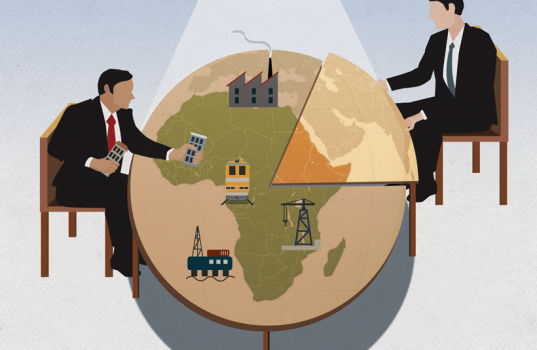Commercial ties are being upended. As recently as 2006 Africa’s three biggest trading partners were America, China and France, in that order. By 2018 it was China first, India second and America third (France was seventh). Over the same period Africa’s trade has more than trebled with Turkey and Indonesia, and more than quadrupled with Russia. Trade with the European Union has grown by a more modest 41%. The biggest sources of foreign direct investment are still firms from America, Britain and France, but Chinese ones, including state-backed outfits, are catching up, and investors from India and Singapore are eager to join the fray. The stereotype of foreigners in Africa is of neocolonial exploiters, interested only in the continent’s natural resources, not its people, and ready to bribe local bigwigs in shady deals that do nothing for ordinary Africans.
商業(yè)關(guān)系正在被顛覆。2006年,非洲最大的三個(gè)貿(mào)易伙伴依次是美國(guó)、中國(guó)和法國(guó)。到2018年,次序是中國(guó)第一,印度第二,美國(guó)第三(法國(guó)第七)。同期,非洲與土耳其和印度尼西亞的貿(mào)易增長(zhǎng)了兩倍多,與俄羅斯的貿(mào)易增長(zhǎng)了四倍多。同期,非洲與土耳其和印度尼西亞的貿(mào)易增長(zhǎng)了兩倍多,與俄羅斯的貿(mào)易增長(zhǎng)了四倍多。與歐盟的貿(mào)易僅增長(zhǎng)了41%。外國(guó)直接投資的最大來(lái)源仍然是來(lái)自美國(guó)、英國(guó)和法國(guó)的公司,但包括政府支持的機(jī)構(gòu)在內(nèi)的中國(guó)企業(yè)正在迎頭趕上,印度和新加坡的投資者也急于加入這場(chǎng)爭(zhēng)奪。非洲對(duì)外國(guó)人的刻板印象就是新殖民主義剝削者,只對(duì)非洲大陸的自然資源感興趣,而對(duì)非洲人民持漠不關(guān)己的態(tài)度,并且準(zhǔn)備賄賂當(dāng)?shù)氐臋?quán)貴,進(jìn)行對(duì)普通非洲人毫無(wú)益處的不正當(dāng)交易。

The stereotype is sometimes true. Far too many oil and mineral ventures are dirty. Corrupt African leaders, of whom there is still an abundance, can always find foreign enablers to launder the loot. And contracts with firms from countries that care little for transparency, such as Russia, are often murky. Three Russian journalists were murdered last year while investigating a Kremlin-linked mercenary outfit that reportedly protects the president of the war-torn Central African Republic and enables diamond-mining there. Understandably, many saw a whiff of old-fashioned imperialism.
有時(shí)情況確如這種刻板印象。太多的石油和礦產(chǎn)企業(yè)都見(jiàn)不得光。腐敗的非洲領(lǐng)導(dǎo)人(現(xiàn)在仍有很多)總能找到外國(guó)的幫兇來(lái)洗黑錢(qián)。此外,與俄羅斯等不太注重透明度的國(guó)家的公司簽訂的合同往往也不透明。去年,三名俄羅斯記者在調(diào)查一個(gè)與克里姆林宮有關(guān)聯(lián)的雇傭軍組織時(shí)被謀殺。據(jù)報(bào)道,該組織保護(hù)飽受戰(zhàn)爭(zhēng)蹂躪的中非共和國(guó)的總統(tǒng),并在那里開(kāi)采鉆石。不難理解,許多人看到了一絲舊式帝國(guó)主義的味道。
However, engagement with the outside world has mostly been positive for Africans. Foreigners build ports, sell insurance and bring mobile-phone technology. Chinese factories hum in Ethiopia and Rwanda. Turkish Airlines flies to more than 50 African cities. Greater openness to trade and investment is one reason why GDP per head south of the Sahara is two-fifths higher than it was in 2000. (Sounder macroeconomic policies and fewer wars also helped.) Africans can benefit when foreigners buy everything from textiles to holidays and digital services.
然而,與外部世界的接觸對(duì)非洲人而言是積極的。外國(guó)人修建港口,出售保險(xiǎn),帶來(lái)移動(dòng)電話技術(shù)。中國(guó)工廠在埃塞俄比亞和盧旺達(dá)蓬勃發(fā)展。土耳其航空公司飛往非洲50多個(gè)城市。對(duì)貿(mào)易和投資更加開(kāi)放是撒哈拉以南地區(qū)人均GDP比2000年高出五分之二的原因之一。(更健全的宏觀經(jīng)濟(jì)政策和更少的戰(zhàn)爭(zhēng)也有幫助。)當(dāng)外國(guó)人購(gòu)買(mǎi)從紡織品到假期和數(shù)字服務(wù)等一切商品時(shí),非洲人可以從中受益。
譯文由可可原創(chuàng),僅供學(xué)習(xí)交流使用,未經(jīng)許可請(qǐng)勿轉(zhuǎn)載。












